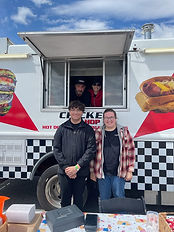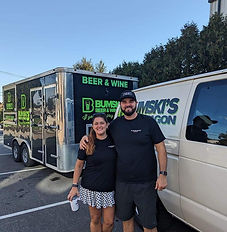How to Start a Food Truck in Connecticut: The Ultimate 2025 Guide
One should identify strategic locations and events in Connecticut that attract a large crowd, ideal for a food truck business. Developing a menu that resonates with the culinary preferences of Connecticut's residents can significantly contribute to the success of a food truck. Consider the weather and seasonal factors in Connecticut when planning the operation schedule and menu for the food truck.


Insurance Coverage for Food Trailers in Connecticut
Insurance Coverage for Food Trailers in Connecticut
In Connecticut, food trailers must be registered through the Department of Motor Vehicles (DMV).
To register, you’ll need the trailer’s title, a completed registration application (Form H-13B), proof of insurance for the towing vehicle, and payment for fees. Registration costs $20 annually for trailers weighing less than 3,000 lbs, and $40 for trailers exceeding that weight. A $5 Clean Air Act fee also applies. Farm-use trailers are exempt from registration.
Title costs are $25, and new registrations also incur a $10 administrative fee.
In Connecticut, the towing vehicle’s liability insurance extends to the trailer. Minimum liability coverage is $25,000 per person, $50,000 per accident, and $25,000 for property damage.
For food trailers, additional collision or comprehensive coverage is recommended to protect equipment and inventory. Proof of insurance must be provided during registration.
Summarized Business Regulations for Cottage Food Laws in Connecticut
Connecticut's Cottage Food Operation refers to a program allowing individuals to prepare certain low-risk foods in their home kitchens for sale directly to consumers. It permits the production of baked goods, jams, jellies, and other specified items, enabling entrepreneurs to start small-scale food businesses without the need for a commercial kitchen. However, there are limitations on sales venues and annual income, and specific labeling and registration requirements must be adhered to under this program.
Example of Successful Food Trucks in Connecticut

Smetana Food Truck
Eastern European food

Soulfully Vegan - Food Truck
Vegan food

East Coast Pizza Truck
Pizza

How to Register and Title Your Food Truck in Connecticut [2025]
In Connecticut, food trailers must be registered through the Department of Motor Vehicles (DMV).
To register, you’ll need the trailer’s title, a completed registration application (Form H-13B), proof of insurance for the towing vehicle, and payment for fees. Registration costs $20 annually for trailers weighing less than 3,000 lbs, and $40 for trailers exceeding that weight. A $5 Clean Air Act fee also applies. Farm-use trailers are exempt from registration.
Title costs are $25, and new registrations also incur a $10 administrative fee.
Find a Food Truck for Sale in Connecticut

Connecticut Food Trailer Braking System Requirements
Trailers with a GVWR of 3,000 lbs or more must have functioning brakes capable of stopping the vehicle within 30 feet at 20 mph.
Electric or hydraulic brakes are permissible. Safety breakaway devices are also required for trailers exceeding this threshold. Trailers under 3,000 lbs are exempt from brake requirements but must have functioning lights.
Lighting, Reflectors, and Safety Chains Requirements for Food Trailers in Connecticut
Connecticut mandates all trailers to have two red tail lights visible from 500 feet, amber reflectors on the sides, and a white license plate light. Turn signals and brake lights are also required. Safety chains rated for the trailer’s full GVWR must connect the hitch to the towing vehicle. Reflectors must be mounted at the trailer's widest points.

![Fast Track to Six-Figure Food Truck Profit in Connecticut [2025 Bundle with Guides, Calculators and Full Business Plan]](https://static.wixstatic.com/media/aec654_682bc4aca3564f72914c4830205a920e~mv2.jpg/v1/fill/w_562,h_375,al_c,q_80,usm_0.66_1.00_0.01,enc_avif,quality_auto/aec654_682bc4aca3564f72914c4830205a920e~mv2.jpg)
















